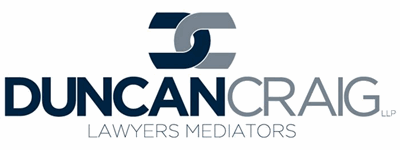Best Lawyers Near You in London, Ontario for Personal Injury Litigation
Practice Area Overview
The primary goal of personal injury law is to put the injured party (the plaintiff) in the same position they were in prior to the injury occurring. Sometimes this is impossible, such as when the plaintiff sustains a permanent or irreversible brain injury or spinal cord injury. In such cases, the goal is to put the plaintiff in as “close a position” as possible to the position the plaintiff was in prior to the occurrence of the injury, including the same financial position had the accident not occurred.
There are several categories of compensation that an injured party may be entitled to receive as part of a personal injury claim. If the injury effects the plaintiff’s employability the plaintiff may be entitled to a loss of income or loss of earning capacity claim. If the plaintiff is no longer able to perform their normal housekeeping chores as a result of their injuries, they may be entitled to recover the ongoing cost of hiring someone to perform these chores. If the injured party is likely to require treatment, medications, or equipment in the future, then a claim can be advanced for the cost of future care. The injured party is usually entitled to reimbursement for reasonable out-of-pocket expenses related to the claim. Another category of damages is compensation for pain and suffering. This award includes compensation for physical pain suffered as well as emotional and psychological injuries sustained by the injured party.
An injured party will only have a claim against a party at fault (the defendant) if the injured party can establish that the defendant was liable or responsible for the injury occurring. In some cases, the injuries to the plaintiff may result from a combination of the defendant’s negligence and the plaintiff’s negligence. A common example is where a plaintiff (who was injured in a motor vehicle accident) had failed to wear a seat belt. The plaintiff’s compensation may be reduced if the defendant can show the plaintiff’s injuries were contributed to by the failure to wear a seat belt. This is commonly referred to as ‘contributory negligence’.
If a plaintiff is unable to resolve their claim with the defendant through the normal negotiating process, then ultimately the plaintiff has the right to have their matter decided by a judge (or judge and jury) at a trial. Only a small percentage of personal injury cases actually proceed to the trial stage as the vast majority of claims are resolved through the normal negotiating process.

Lawyers who have a subscription to profiles appear first.
Would you like to claim your lawyer profile?
Contact UsOur Methodology
Recognition by Best Lawyers is based entirely on peer review. Our methodology is designed to capture, as accurately as possible, the consensus opinion of leading lawyers about the professional abilities of their colleagues within the same geographical area and legal practice area.
The Process
Best Lawyers employs a sophisticated, conscientious, rational, and transparent survey process designed to elicit meaningful and substantive evaluations of the quality of legal services. Our belief has always been that the quality of a peer review survey is directly related to the quality of the voters.












